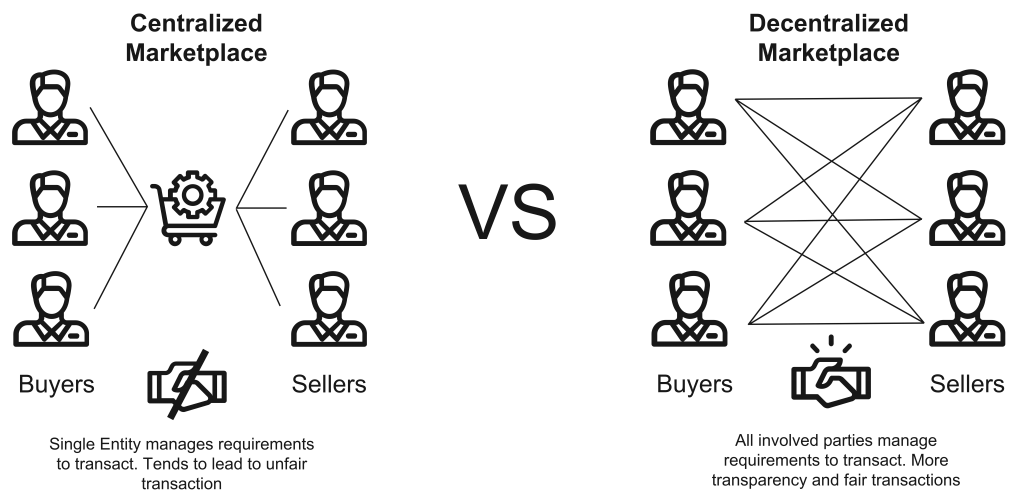For many years we have been accustomed to transacting goods and services on traditional centralized marketplaces to reduce the risk of transacting with unknown and untrusted sellers and facilitate financial transactions through intermediation from a centralized party. Blockchain technologies are enabling a new and better way of transacting and conducting business.
Buying online is a risky business. To that effect, traditional marketplaces have previously used different techniques and methods to reduce risks, including reputation systems, payment gateways, identity verification systems, among others. Nebulai proposes a new and better way of transacting technology solutions and Talent. This new way is via a decentralized marketplace which allows organizations to search and find Solutions and Talent needed to digitize their business without having to incur the risk of transacting with unknown parties or unverified providers and Talent. The marketplace we propose, de-risks transactions utilizing blockchain technology, smart contracts, decentralized identities, and a decentralized reputation system that allow for one to many or many to many contract arrangements.
The Problem
The business to business (B2B) buying journey today isn’t easy, companies looking to digitize their business are having a hard time finding the right technology provider for their business challenge and losing a lot of time trying to pick a technology provider that can work on their project; making sure that the provider can deliver on the project specifications on time and budget; having to deal with multiple contracts and high legal fees and complexity; paying high transaction fees when transferring funds to their vendors, and more often than not, creating Intellectual Property (IP) that does not get monetized.
On the technology provider side, not getting paid on time; customers changing the scope of the contract; inability to find customers for their solutions; inability to get funding to develop new intellectual property; not having an ecosystem that can enable collaboration with other providers, and not having a platform that allows them to monetize their IP.
Furthermore, investors that join our ecosystem will be able to leverage Decentralized Finance (DeFi) to provide capital for organizations and technology providers in exchange for revenue share on the solutions and IP developed in the DSTM.
Any projects that involve the engagement of talent are not necessarily fair all the time for the knowledge worker, they may not get hired at all due to bias; they may not get paid on time, or at all for the work they do, and they may not be able to engage directly on projects with large organizations without intermediaries in a way that allows for fair trade of their services.
Centralized vs De-Centralized Marketplaces
What are the main differences between a centralized and decentralized marketplace?
A centralized marketplace:
- Has single or multiple entities involved in the operation of that marketplace
- Centrally mediates contract disputes
- Directly manages financial transactions through an Escrow service or third-party payment gateway
- May use a centralized custodian as the owner of the reputation system which allows buyers and sellers to rely on the historic performance or past transactions
In contrast, a decentralized marketplace:
- Consists of multiple independent operating nodes distributed across a blockchain system
- Automatically executes financial transactions using cryptocurrencies, stable coins, or digital fiat without the need of a payment processor
- Uses a combination of third-party brokers and Smart Contracts to facilitate the integrity of the contract arrangement. This combination also regulates the legal relationship between the parties based on the terms and conditions stipulated
- Can have a transparent reputation system as all transactions are recorded in the blockchain, removing the need to trust any intermediating entity to manage this process. All public transactions are publicly verifiable as they are stored in all the nodes participating in this decentralized system. All private transactions are validated by invited nodes that are authorized, vetted, and permissioned
How does the Nebulai Decentralized Marketplace add any value to the existing way of doing business?
First, because Smart Contracts remove third-party custodians from the position of influencing the contracting process.
Second, the decentralized system allows for the identification and acquisition of “human capital skills”. Thus, empowering the individuals participating in the Talent ecosystem by removing barriers to entry, contracting bias, and democratizing the way Talent is discovered and engaged.
This whitepaper explains how a Decentralized Solutions & Talent Marketplace (DSTM) disrupts the way organizations discover, acquire, and build business & technology solutions, and engage Talent to expand their workforce. All this is achieved, through a Collective Intelligence ecosystem implemented as an online decentralized marketplace using Smart Contracts and Decentralized Identities.



